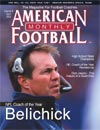AMERICAN FOOTBALL MONTHLY THE #1 RESOURCE FOR FOOTBALL COACHES
|
|
Article Categories
|
NFL Coach of the Year Runners-upby: Richard Scott© More from this issueBUTCH DAVIS
When the Cleveland Browns hired Butch Davis as the second head coach
in the three-year history of the new Browns franchise, Davis was
told to beef up the defense and the running game and field a team
that resembled the aggressive, hard-nosed kind of football Browns
fans have been accustomed to back in the old days.
More important, he was instructed to take the core of a team that
had gone 5-27 over its first two seasons and turn the Browns into
winners.
“Everyone needed to stop seeing themselves as losers here.
Everyone told them what bad players they were,” Davis said.
“We probably spent the first six months on the menta....The full article can only be seen by subscribers.
Subscribe today!

|
|
|
NOT A SUBSCRIBER?
Subscribe
now to start receiving our monthly magazine PLUS get INSTANT
unlimited access to over 4000 pages of 100 percent football coaching
information, ONLY available at AmericanFootballMonthly.com!
|
|
|
HOME
|
MAGAZINE
|
SUBSCRIBE
|
ONLINE COLUMNISTS
|
COACHING VIDEOS
|
Copyright 2026, AmericanFootballMonthly.com
All Rights Reserved






